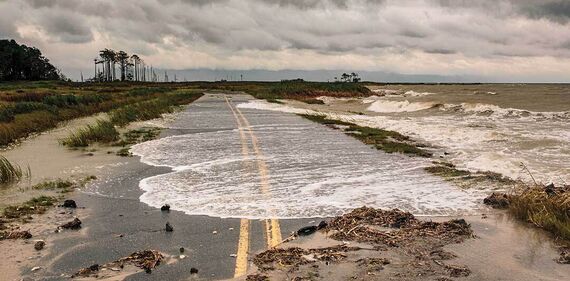
Managing Coastal Retreat
With coastal and riverine land areas prone to flooding and inundation, managing the retreat of existing land uses represents a significant challenge to state and local governments. The Georgetown Climate Center (GCC) recently released the Managed Retreat Toolkit, the first comprehensive online legal and policy resource to support peer learning, public engagement, and decision-making around managed coastal retreat in the context of climate change adaptation.
Communities across the U.S. are facing urgent challenges from sea-level rise and climate impacts; a new report from the National Oceanic and Atmospheric Administration documented the increasing frequency of "sunny-day" flooding in coastal areas, and recent analysis by the First Street Foundation suggests that millions more U.S. homes are at risk of catastrophic flooding than previously estimated. Communities and states are increasingly considering managed retreat – the voluntary movement of communities and transition of ecosystems away from vulnerable coastal areas – as a strategy for protecting people, infrastructure, buildings, and coastal ecosystems from the impacts of climate change.
To help state and local policymakers who are considering managed retreat, the Georgetown Climate Center released the Managed Retreat Toolkit. The first comprehensive online legal and policy resource on managed retreat, the toolkit combines legal and policy tools, best and emerging practices, and case studies to support peer learning, public engagement, and decision-making around managed retreat and climate adaptation.
Georgetown Climate Center’s launch webinar drew more than 450 attendees from across the country. Featured speakers included Fawn McGee of the New Jersey Blue Acres Program and Liz Williams Russell of the Foundation for Louisiana, who discussed their experiences working with communities to implement retreat strategies. The Blue Acres Program and LA SAFE, which the Foundation for Louisiana helps implement, are both featured in case studies in the Managed Retreat Toolkit.
The toolkit features more than 70 case studies from communities across the US that have begun engaging with managed retreat strategies. GCC also released Managing the Retreat from Rising Seas, a companion publication that presents 17 case studies in greater depth.
GCC developed the Managed Retreat Toolkit in concert with leading state, local, and federal policymakers, academic leaders, and people from affected communities. Between 2018 and 2020, GCC’s outreach efforts related to the development of the Managed Retreat Toolkit have engaged more than 1,000 people at more than 20 events, a testament to the growing interest in this important topic.
This work was completed under the leadership of Prof. Vicki Arroyo, with collaboration from Prof. Peter Byrne, Prof. Sheila Foster, Prof. Elizabeth Ferris, and Prof. Uwe Brandes. Katie Spidalieri served as the lead author of the report.
Photo by Greg Kahn retrieved from Antropocene Magazine

